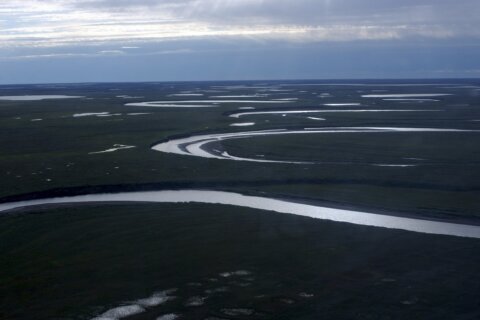NASHVILLE, Tenn. (AP) — A Tennessee gravel and sand mining operator has been ignoring a cease and desist letter for months, and opponents say its continued construction on the banks of North America’s most biodiverse river may already be harming wildlife.
The Duck River in Middle Tennessee has the most species of any river on the continent, Tennessee Wildlife Resources Agency Assistant Chief of Biodiversity Pandy Upchurch said, with at least 151 species of fish and 55 species of mussels including eight federally endangered species.
So when Volunteer Sand and Gravel began seeking permission to mine right next to the river, there was plenty of opposition. The operators received some permits, including from the Tennessee Department of Conservation and Environment, but withdrew their application for a permit from the Tennessee Valley Authority, which controls that river system.
The TVA Act requires the public utility to approve any construction that could affect flood control, such as the pit mining operation and the berms the company is building around the site, all within the floodplain. Although Volunteer never received a TVA permit, it went ahead with construction.
TVA sent a cease and desist order in December and has followed up with three additional letters, but the company has never responded.
Volunteer President Chad Swallows declined an interview request, but in an email said the company determined it does not need a permit from TVA because the project “does not affect flood control.”
Meanwhile, with heavy rains in March, opponents say the predictable happened. Photos show the construction site inundated by flooding with a light-colored plume streaming away from it. The Tennessee Department of Environment and Conservation issued a notice of violation to the company. Swallows is contesting the violation, claiming the plume is not sediment but clean water coming off a nearby creek.
Several environmental groups are pushing TVA to take stronger action. In a letter last month, the groups urged TVA to seek a federal court injunction against Volunteer that would force it to stop construction. Volunteer recently told TDEC it is on track to finish construction and begin mining next month.
“TVA’s lack of enforcement in the face of Volunteer Sand & Gravel’s egregious and open disregard of the agency’s permitting authority calls into question TVA’s commitment to protecting the watersheds of the Tennessee River Valley,” the letter reads. “TVA’s inaction sends the wrong message to other developers and mining companies who wish to develop shorelines….”
Asked why TVA has not sought a court order to enforce its permitting authority, spokesman Scott Brooks would not confirm in an email whether or not they will do so.
Amanda Garcia is director of the Southern Environmental Law Center’s Nashville office. She said sediment is a huge problem because it affects water quality for all species, although it can be especially harmful to mussels.
“If you dump a bunch of dirt on top of mussels, they’re going to die,” she said.
She noted that the stretch of river containing the mine is a critical habitat for several endangered species and it is just upstream from a national wildlife refuge.
Tennessee Wildlife Federation, which represents hunters, anglers and other outdoor enthusiasts, sent a letter to TDEC in early March warning that the design of the mining operation was such that when flooding overtopped the berms it would flush large amounts of sediment into the river and surrounding wetlands. Only two weeks later, that happened, Federation CEO Michael Butler said in an interview.
He said the Duck is “just a special place” because of its incredible biodiversity including “several species where this is the only place they appear on Earth.” Butler said the Tennessee Wildlife Federation believes the open-pit design of the mining operation will continue to pollute the river during increasingly frequent flooding, which he said occurs about every-other year.
Michael Crane is a retired physician who owns about 300 acres of farmland just downstream from the mine. He has worked with the U.S. Department of Agriculture’s Natural Resources Conservation Service to improve his bottomland, which was heavily eroded, into a riparian forest with more than 3,000 trees.
He has watched the progress of the mine in horror, writing to TVA and other agencies about his concern that the entire site could wash out and alter the course of the river, drowning his property and destroying all his work.
“You’ve got the prettiest river in North America, and then you’ve got somebody mining on it,” he said. “I don’t care if they mine and it only damages their stuff, but these people are willing to destroy other people’s land. And there’s no way they can fix it.”
Copyright © 2024 The Associated Press. All rights reserved. This material may not be published, broadcast, written or redistributed.







